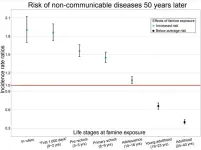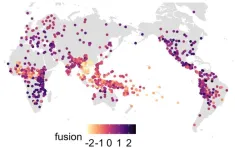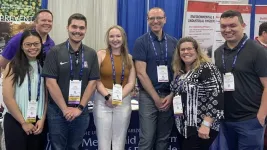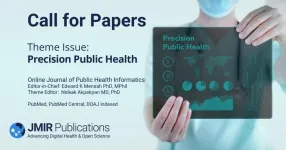(Press-News.org) The World Health Organisation (WHO) has updated its recommendation for malaria-preventing mosquito nets based on new research from the University of Adelaide.
Dr Timothy Barker, of the JBI Adelaide GRADE Centre, located at the University of Adelaide, led a team which proved the effectiveness of a combination of insecticides when used to treat malaria-preventing mosquito nets.
Mosquito nets treated with pyrethroid insecticides have been distributed into malaria-prone regions globally since 2005, but some mosquito populations have developed a resistance to the substance.
“The number of malaria cases actually increased in 2020, whereas there was a continued and steady decrease in the number of malaria cases observed from 2000 to 2019,” said Dr Barker.
“Given this, the WHO was interested in a new type of bed net that had been recently investigated in some clinical trials that might combat this issue.
“In order for any new recommendation for healthcare to be made, results from individual trials need to be systematically reviewed. As experts in research methodology, systematic reviews and the development of guidelines for recommendation, the WHO asked us to assist them in this process.”
Dr Barker’s team analysed the results of randomised controlled trials conducted in the Republic of Benin, Burkina Faso and Tanzania, where mosquitoes were demonstrated to be resistant to the standard insecticide. They found combining pyrethroid insecticide with chlorfenapyr improved its effectiveness.
“Chlorfenapyr acts as a synergist to the pyrethroid insecticide by disrupting the mosquito’s ability to produce energy. This increases the ‘killing effect’ of the net with no additional harm to the person sleeping under it,” Dr Barker explained.
The WHO has updated its malaria guidelines to include nets treated with pyrethroid-chlorfenapyr, as well as with a less-effective pyrethroid-pyriproxyfen combination. Sleeping under a mosquito net is one of the best ways to protect against mosquito bites that spread malaria.
In 2021, nearly half the world’s population was at risk of malaria. There were an estimated 247 million cases and 619,000 deaths worldwide in that year.
“To directly contribute to a recommendation that will prevent people from developing malaria, and subsequently reducing the number of people that may unfortunately die due to this terrible disease is something that I am extremely proud of,” Dr Barker said.
“To do this work on behalf of the University of Adelaide, using the resources and skills that I have developed as both a student and researcher of this institution I believe is a testament to the international impact that our University can provide.”
The University of Adelaide’s systematic review will be published in PLOS ONE on Thursday,17 August.
Media contact:
Dr Timothy Barker, PhD, Research Fellow, Health Evidence Synthesis, Recommendations and Impact, School of Public Health (HESRI), Deputy-Director, JBI Adelaide GRADE Centre, University of Adelaide. Mobile: +61 0410 116 294, Email: timothy.barker@adelaide.edu.au
Johnny von Einem, Media Coordinator, The University of Adelaide. Mobile: +61 0430 476 300, Email: johnny.voneinem@adelaide.edu.au
Australian University Provider Number PRV12105 | CRICOS Provider Number 00123M
END
Research informs WHO malaria net guideline update
2023-08-16
ELSE PRESS RELEASES FROM THIS DATE:
What role do dust storms play in the world’s climate?
2023-08-16
Giant dust storms in the Gulf of Alaska can last for many days and send tonnes of fine sediment or silt into the atmosphere, and it is having an impact on the global climate system, say scientists.
The storms are so extensive they can be seen by satellites orbiting the Earth. An image captured by the Landsat satellite in 2020 shows dust blowing out of the valley and over Alaska’s south coast.
Exactly how the dust may be influencing the global climate system is not yet clear, although new research from the University of Leeds and the National Centre for Atmospheric ...
Children and adolescents of the 1959-61 Chinese famine: Survivors face increased risk of non-communicable diseases 50 years later, with those exposed in utero or under age 2 at double the risk
2023-08-16
Children and adolescents of the 1959-61 Chinese famine: Survivors face increased risk of non-communicable diseases 50 years later, with those exposed in utero or under age 2 at double the risk.
####
Article URL: https://journals.plos.org/globalpublichealth/article?id=10.1371/journal.pgph.0002161
Article Title: Exposure to the 1959–1961 Chinese famine and risk of non-communicable diseases in later life: A life course perspective
Author Countries: Switzerland, UK
Funding: Mengling Cheng acknowledges funding from the Swiss National Centre of Competence in Research “LIVES - Overcoming vulnerability: ...
The evolution of complex grammars
2023-08-16
Languages around the world differ greatly in how many grammatical distinctions they make. This variation is observable even between closely related languages. The speakers of Swedish, Danish, and Norwegian, for example, use the same word hunden, meaning "the dog", to communicate that the dog is in the house or that someone found the dog or gave food to the dog. In Icelandic, on the other hand, three different word forms would be used in these situations, corresponding to the nominative, accusative, and dative case respectively: hundurinn, hundinn, and hundinum.
This grammatical distinction in the case system, along with many others, sets Icelandic apart ...
DOE’s Office of Science is now accepting applications for Office of Science Graduate Student Research (SCGSR) Awards
2023-08-16
Washington, D.C. - The Department of Energy’s (DOE) Office of Science is pleased to announce that the Office of Science Graduate Student Research (SCGSR) program is now accepting applications for the 2023 Solicitation 2 cycle. Applications are due on November 8, 2023, at 5:00 pm ET.
SCGSR application assistance workshops will be held on Thursday, September 14, 2023, 2:00 PM – 3:30 PM ET and Tuesday, October 10, 2023, 2:00 PM – 4:30 PM ET. The first workshop will provide a general overview of the program and the application requirements and will include a time for discussing potential research topics ...
Occupational safety and health training program grant renewed
2023-08-16
The National Institute for Occupational Safety and Health, a division of the National Institutes of Health, awarded a $750,000 training program grant to researchers at the Mel and Enid Zuckerman College of Public Health to support master’s students in the Industrial Hygiene Program.
Industrial hygiene is the art and science devoted to the anticipation, recognition, evaluation and control of workplace hazards. It focuses on worker protection from hazards that could include chemical, physical, biological, radiological and ergonomic agents.
“Occupational injury and illness affect millions of workers and their families every year and are tremendous ...
Inaugural theme issue: Precision public health from online Journal of Public Health Informatics
2023-08-16
Online Journal of Public Health Informatics (OJPHI) Editor-in-Chief: Edward K Mensah PhD, MPhil and theme editor Nsikak Akpakpan MD, PhD welcome submissions to a special theme issue examining "Precision Public Health."
The inaugural issue of the Online Journal of Public Health Informatics under the JMIR Publications platform will feature articles on precision public health, a technology-enhanced, data-driven targeted approach to public health practice and research.
The current special issue invites articles in the following as well ...
UC Irvine scientists say deepening Arctic snowpack drives greenhouse gas emissions
2023-08-16
Irvine, Calif., Aug. 16, 2023 — Human-caused climate change is shortening the snow cover period in the Arctic. But according to new research led by Earth system scientists at the University of California, Irvine, some parts of the Arctic are getting deeper snowpack than normal, and that deep snow is driving the thawing of long-frozen permafrost carbon reserves and leading to increased emissions of greenhouse gasses like carbon dioxide and methane.
“It is the first long-term experiment where we directly measure the mobilization of ancient carbon year-round to show that deeper snow has the possibility to rather ...
Damon Runyon Cancer Research Foundation awards $3.9 million to exceptional early-career scientists
2023-08-16
The Damon Runyon Cancer Research Foundation has named 13 new Damon Runyon Fellows, exceptional postdoctoral scientists conducting basic and translational cancer research in the laboratories of leading senior investigators. This prestigious Fellowship encourages the nation’s most promising young scientists to pursue careers in cancer research by providing them with independent funding to investigate cancer causes, mechanisms, therapies, and prevention. In July 2023, the Board of Directors announced a 15% ...
Assessing controls on ocean productivity – from space
2023-08-16
Phytoplankton determine how much life the ocean is able to support and play a role in controlling atmospheric carbon dioxide concentrations, thereby regulating our climate. These tiny marine plants depend on sunlight as well as nutrients to thrive – including elements such as iron or nitrogen that can be brought to the ocean surface by currents and upwelling.
To understand phytoplankton nutrient limitations in the ocean, scientists typically conduct experiments during research expeditions at sea. However, this approach documents only a tiny fraction of the ocean at a certain point in time. Therefore, an international team of researchers tested if a signal detected by satellites in ...
Medications for chronic diseases affect the body’s ability to regulate body temperature, keep cool
2023-08-16
Medications to treat various chronic diseases may hinder the body’s ability to lose heat and regulate its core temperature to optimal levels. The loss of effective thermoregulation has implications for elderly people receiving treatment for illnesses like cancer, cardiovascular, Parkinson’s disease/dementia and diabetes, particularly during hot weather, according to a review by a team of scientists from various institutions in Singapore.
The group, led by Associate Professor Jason Lee from the Human Potential Translational Research Programme at the Yong Loo Lin School of ...




